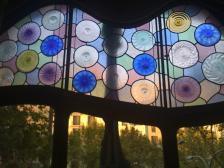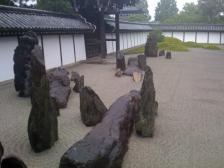Marc Lesser's Blog, page 33
August 1, 2012
Peaceful Life

Peaceful Life, a poem by Katagiri Roshi
Being told that it’s impossible,
One believes, in despair, “Is that so?”
Being told that it is possible,
One believe, in excitement, “That’s right.”
But whichever is chosen,
It doesn’t not fit one’s heart neatly.
Being asked, What is unfitting?”
I don’t know what it is.
But my heart knows somehow.
I feel an irresistible desire to know.
What a mystery “human” is!
As to this mystery:
Clarifying
Knowing how to live
Knowing how to walk with people….
The full poem can be found here: http://www.sacred-texts.com/bud/zen/katagiri.txt
Possible or impossible; which is it?
Katagiri Roshi was the teacher of the Minnesota Zen Center for many years, until he died in 1990.
This is a poem about saying “Yes!” to our lives, to the mystery, the messiness, the love, the impossibility of being a human being.
May 13, 2012
Cultivating Joyful Mind, Kind Mind, Great Mind

“Instructions To the Head Cook” is one of my favorite pieces of writing from Dogen, the 13th century founder of Zen in Japan. In it he describes the three states of mind that the head cook should cultivate in all activities in the kitchen: Joyful Mind, Kind Mind, and Great Mind.
I’m struck by this simple yet radical notion of cultivating states of mind. Usually we feel as though our state of mind, our feelings and emotions just happen, generally in relation to the events and circumstances of our lives. And, of course we are influenced by what we do and what happens in our lives, within and outside of our own control. At the same time, what a powerful idea, that we can cultivate states of mind. Here are three states of mind suggested by Dogen, that are applicable to our lives, not only in the kitchen but anywhere, at work, or outside of work:
March 1, 2012
Just Being Present

A Zen teacher from the 9th century in China could sometimes be heard having a stern conversation with himself: "Master Zuigan!" he would call out. "Yes?," he would inquire, "Are you here?" "Yes!" He responded to himself.
How sweet, how odd, and how wonderful! This Zen teacher underscores how challenging it can be to be present, to show up, to be present for ourselves, and for our lives. And he didn't have a smart phone, the internet, or television to contend with. It seems that showing up and being fully present has always been challenging.
I've been reading a book by poet Jane Hirshfield called Nine Gates: Entering the Mind of Poetry. In an essay about concentration she says:
January 25, 2012
Take Care of the World, Take Care of You

There is a famous story from the Zen tradition that has been passed down for more than a thousand years, about two Zen teachers discussing a primary issue of where we put our focus and attention:
One teacher asks another, "Where do you come from?"
The second replies, "From the south."
The first asks, "How is Zen practice in the South these days?"
The second responds, "There lots of discussion."
The first states, "How can all the discussion compare to planting the fields and cooking rice?
The second asks, "What are you doing about the world?"
The first replies, "What do you call the world?"
What do you call the world? How do you take care of the world and take care of yourself?
December 29, 2011
Balance: I Don’t Take Any Of This For Granted

Balance: Forget about balance. We are always out of balance. Always in perfect balance.
I sat meditation this morning as I do nearly every morning at about 6:00 a.m. This morning it was quiet, dark and cold. A wonderful way to begin my mornings. I don’t take it for granted, the privilege to begin my day in this way. The privilege to live in a place where I can feel safe. The privilege of having a body and mind, to be able to sit cross legged on a black cushion. I know I won’t always be able to cross my legs. What a pity, impermanence. And how wonderful and mysterious. And I don’t like it, that I won’t always be able to sit, to hug my wife and children, to chop fresh garlic for zucchini soup, to walk to the beach with my friends. I often think of creating a support group called BAC, Buddhist’s Against Change.
Balance: I Don't Take Any Of This For Granted

Balance: Forget about balance. We are always out of balance. Always in perfect balance.
I sat meditation this morning as I do nearly every morning at about 6:00 a.m. This morning it was quiet, dark and cold. A wonderful way to begin my mornings. I don't take it for granted, the privilege to begin my day in this way. The privilege to live in a place where I can feel safe. The privilege of having a body and mind, to be able to sit cross legged on a black cushion. I know I won't always be able to cross my legs. What a pity, impermanence. And how wonderful and mysterious. And I don't like it, that I won't always be able to sit, to hug my wife and children, to chop fresh garlic for zucchini soup, to walk to the beach with my friends. I often think of creating a support group called BAC, Buddhist's Against Change.
November 28, 2011
"Don't Stop The Line" and the Courage To Stop

"If you have these two things – the willingness to change, and the acceptance of everything as it comes, you will have all you need to work with."
- Charlotte Selver
"Don't stop the line." For many years this was an agreement, almost an unwritten law of the General Motors assembly lines building cars and trucks. Management believed that keeping the car assembly line going at all times was essential. Keeping the line going was clearly more efficient than stopping the line. According to a 30-year GM employee, management assumed that "If the line stopped workers would play cards or goof off." As a result of this philosophy and way of working, problems were ignored instead of addressed. Defective cars, some missing parts, or cars with parts put on backwards were put into their own special "defective" lot. This lot grew to enormous proportions. At some point, addressing and fixing these problem cars became too costly.
October 20, 2011
More Vitality

"I am always doing that which I cannot do, in order that I may learn how to do it."
- Pablo Picasso
"The antidote to exhaustion is not rest. The antidote to exhaustion is wholeheartedness."
- Brother David Steindl-rast
I was recently sitting in the office of a senior executive of a major corporation in the San Francisco Bay Area. We were meeting for the first time. During this conversation he shared with me his disappointment about work. "What happened?" he pondered. He had begun this job with such excitement and enthusiasm and now he felt discouraged and tired. "How did I get so busy, and disconnected? What happened to the enthusiasm and excitement I had for life as a child? When did my life get so out of balance?"
September 6, 2011
The Hero's Journey

If you judge a fish by its ability to climb a tree, it's going to spend its life believing it's and idiot. - Einstein
We are all heroes on our own journey. Sometimes we forget. Whatever we are doing, however mundane, however meaningful, this moment is unique and cannot be repeated.
We are always in some kind of transition. Writing now for me is a transition. I begin the process, setting out from the known to the unknown. I leave the comfortable world of not saying anything. Now, what to write? Then, at some point this transition will be complete.
The hero's journey, our hero's journey is like this. We set forth toward something, leaving the comfort of what we know. At this stage of the journey we need to let go of something. What is it that needs to be let go of for you in your life?
August 12, 2011
How To Decide

When deciding about the work I do, I envision three circles: Impact, Joy, and Financial Sustainability. Does my work have positive impact, does it bring joy to me and to others, and is it financially sustainable for my life?
First, just applying these criteria shifts my focus from fear, worry and survival; shifts my attention from my day-to-day concerns to something larger, to how I want to show up, to how I want to live. There is certainly a lot to be afraid of and to worry about. There is so much instability in many parts of our economy, in our relationships, and our lives. And yet, where do we choose to put our attention?
When it comes to work, I choose to put my attention on doing what has impact, what brings joy, and moves me toward financial sustainability.
Impact



